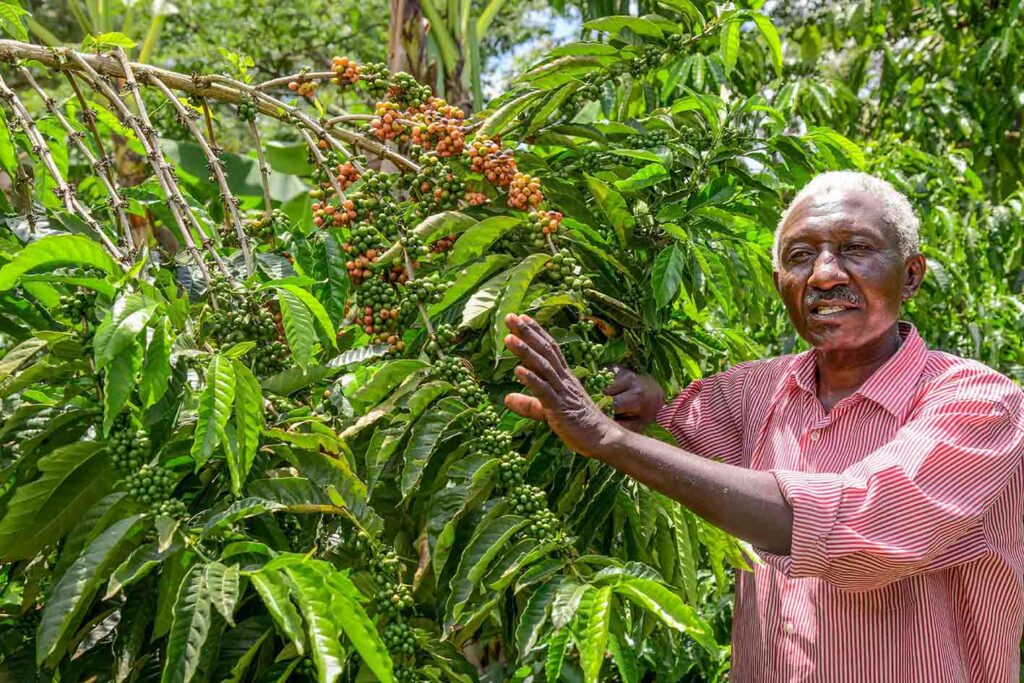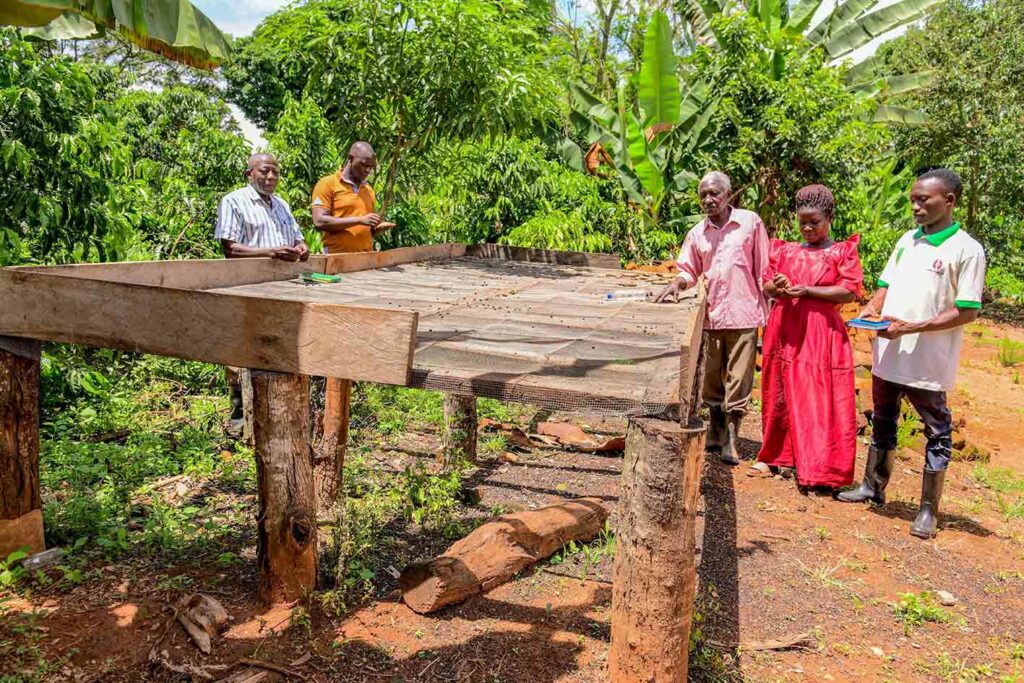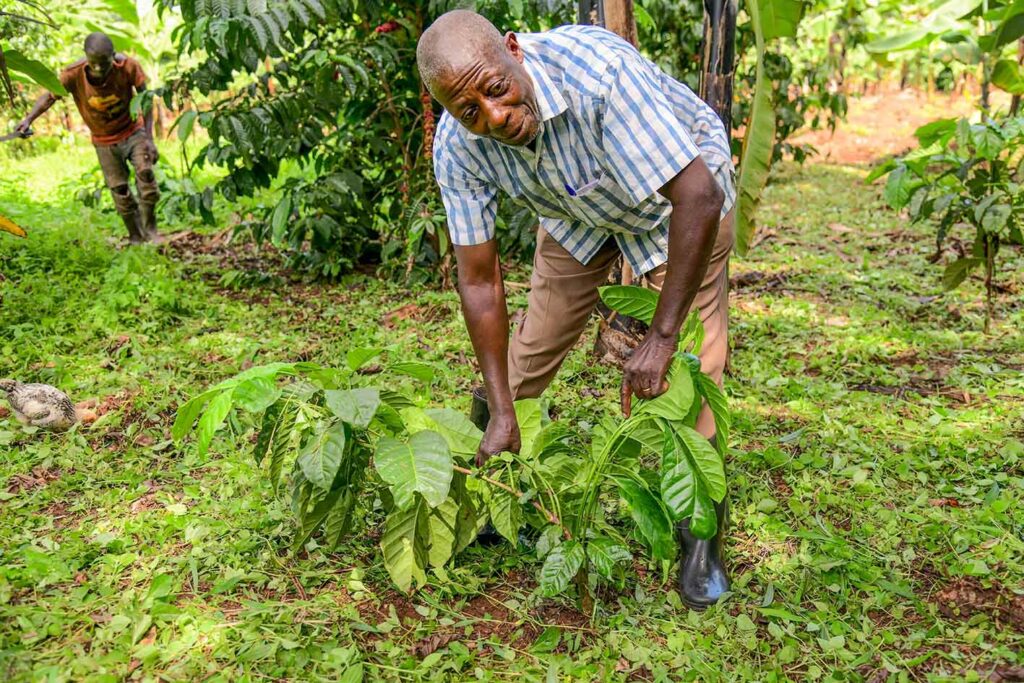By HERBERT MUSOKE
aBi-development has supported many farmers countrywide achieve better yields and earnings. aBi’s focus is to increase agricultural production and value addition by extending matching grants and business development services to agribusinesses, farmer organisations and intermediaries to enhance planning and management. They also support production and business infrastructure, as well as upstream and downstream market linkages of producers and agribusinesses. In an eight-part series, Harvest Money shall carry stories focusing on the success of aBi activities countrywide. In the fouth story, Herbert Musoke casts the spotlight on aBi’s interventions in the coffee value chain in Kyankwanzi

The lack of technical information has kept farming stagnant as farmers have kept on doing farming the same ordinary way which has affected the production and development of agriculture.
Kyankwanzi coffee farmer group is one of the coffee farmers’ groups that has seen increased production and revenue with the support from aBi through The Edge Trading Limited which has trained farmers in the best coffee farming practices.
Matia Tamale a farmer at Gayaza-west, Gayaza sub-county in Kyankwanzi district and the chairman of this group explains that before getting training from The Edge Trading Limited, farmers used to just grow coffee the ordinary way as their parents used to do but after the training, they changed the practices and now are earning more.
Coffee has remained one of the leading commodities employing about five million Ugandans in production and other coffee associated activities according the report in The Robusta Coffee Handbook 2019.
Uganda governments’ mission of producing 20 million quality coffee bags of 60kgs by the year 2040. The Uganda coffee development report 2022, indicates that Uganda exported 6.26 million 60kg bags worth US$862.28 million in 2021/22 compared to 6.08 million bags worth US$ 559.16 million the previous year.
Kyankwanzi coffee farmer group
Tamale explains that this group was at first for farmers at Gayaza West but after, being contacted by The Edge Trading Ltd, they have increased their operation and membership to the entire Gayaza-subcounty and Kyankwanzi town council.
“We now have 40 groups with each group having 25 members. These groups have been very instrumental in transferring technical information to the farmers because for every four groups have one facilitator who is responsible for monitoring and continued advising farmers on best agronomic practices,” he says.
He says that they have been trained in best ways of pruning, weeding, spacing, diseases and pest control, fertilizer application all of which have resulted into increased production and quality of coffee beans.
“We hold meetings every week and save shs2, 000. This is the money that we use to lend to members who want to borrow for inputs such as fertilizers, buying insecticides among others and they pay after harvest,” he says.
“To ensure quality, we only pick the red ripened beans because its those beans that are well matured but also, were you pick this season is where the tree will bare barriers the next season. Also, we dry our coffee on tapelines and racks to avoid molds and contamination,’ he explains.
Market and value addition
He says that for post-harvest handling, they were advised to have stores in which they keep their well dried coffee before selling.
“We also encourage selling as a group where we get a vehicle and pick a given number of bags from each members weigh and take to the factory for processing. Because they sale together, it is every members’ obligation to ensure the other keeps quality because if one has poor quality, it will equally affect the others coffee quality,” he says.
He says that, they no-longer sell black dried coffee beans (Kibooko) because they can afford transporting their coffee to the factory to process green beans (Kase) which fetches higher prices of about shs6, 400 a kilogram compared to shs2, 500 of dried black beans.
“The coffee processing factory has been our challenge but we are now hopeful because Edge is in the final stages of completing the coffee processing coffee where we shall take our coffee for processing here in Kyankwanzi town as the one we have is at Ntwetwe which is far,” he says.
They are optimistic that they will be able to get back the coffee husks to use as fertilizer in their coffee gardens which they can’t now as it is not cost effective.
“Middle men were a thorn in the fresh as they would always, set they prices as they wish but now that is sorted by The Edge as they not only process but also buy from us and then take our coffee to markets that pay us better prices,” he says.

Challenges
Tamale explains that thy have a challenge of Black coffee twig borer that affects the small branches that bare the fruits. They infect them and make them dry.
“Long drought is another challenge affecting us as coffee farmers. During this season, we lose both quality and quantity because we don’t have capacity to irrigate,’ he stresses.
Shade management
John Bosco Makumusana Ssenkima explains that he inherited his coffee shamba from his late father with a lot of shade trees especially Mugavu, Mutuba and other trees thinking, coffee need shade to protect it from the scorching sunshine.
“It is from the training I got from The Edge two years ago that I learnt that coffee does better with less shade and where I have reduced shade, the trees have put on more beans than before. In addition, we were advised on the tree varieties that provide good shade like; Mutuba, Mugavu, Mukookowe among others that shade off their leaves unlike, Jackfruit, mangoe,” he says.
Also, the coffee trees were very old and huge but they have agreed as all members to have pruned their coffee by the end of this year and for that, Ssenkima has pruned half of his shamba and he says he has already seen a positive change.
“I have also learnt that the spacing my parents used of about 10X10 affects productivity of the farm as it reduced the amount to be harvest. Now I have started filling the spaces with quality varieties as we were trained,” he adds.
To maintain quality, Ssenkima constructed a rack on which he dries his coffee and also turned his former visitors’ quarters into a store in which he will be storing his coffee but also help fellow group members without storage to store their coffee.

We need support for irrigation
Angela Namata is a farmer at Ndibata-A village in Gayaza sub-county explains that for the two and a half years she has been working with Edge, many things has changed in her farm which has led to increased production.
“Right away I pruned my coffee trees, which has eased harvesting because now even my small grand-children can pick the red-ripened beans because the trees can easily be bend just as we were advised that a tree that can be bent, should be cut off unlike before when the trees were very huge and hard,” she says.
She adds that as members they have started planting improved colonal coffee varieties of KR1-7 but they are looking for other varieties from KR8-12.
“I have about five acres but continuing to plant as I interest my son who has so far planted an acre and managing it as were trained. However, I want irrigation system because I have a tribute of Kitumbi river on my land where I can get water to irrigate my coffee,” she says.
Difasi Mukasa Nassan an agronomist for The Edge Trading Limited in Kyankwanzi, says that many farmers have not realized the potential of their coffee farms because they are old and not cared for properly which has severely affected their production and productivity.
“Majority of the coffee shambas have existed for generations as farmers don’t prune assuming that the more the tree matures, the more it produces which is wrong because as the tree ages, its cherry production naturally decreases with age,” he says.
In addition, the soils are getting exhausted in addition to phytosanitary problems with high postharvest losses, high levels of contamination, farmers lacking knowledge and financial resources to improve their productivity.
The Edge Trading Limited
Edge was in 2011 registered with the Uganda registration services bureau and licensed by the Uganda coffee development authority to trade in coffee both locally and export market as it stepped in to help farmers improve returns.
The company has continuously supported farmers in areas of Mpigi, Butambala, Gomba, Kalungu and Kyankwanzi districts to increase production of both Arabica and Robusta coffee varieties.
It also aggregates green coffee from both farmers and primary processors. It further processes, grades and packages it into 60kg bags for both the local and export markets.
Amos Kasigi the Executive director of the Edge Trading Ltd, says that as they began their operations, they realized that farmers were simply growing coffee because they were given, saw or told it is a cash crop for daily income.
“Because we want quality and quantity, we had to start with changing the mindset of farmers to start looking at coffee as a business. Here, we introduced quality seedlings of different varieties and also setup demonstration gardens that we used for training farmers into modern and proper farming practices,” he says.
Working with aBi
Their target was 2,000 farmers and in 2016, they went seeking for donor funders and Agricultural Business Initiative Ltd (aBi) became their first donor partner as it granted them funds in 2019 with which they were able to support 6,000 coffee farmers in all the districts of their operation.
With the demonstration farms, farmers were trained on seedling selection, preparation of gardens for planting coffee, fertilizer varieties and application, weeding, pruning, stamping, post-harvest handling, record keeping and formation of groups and co-operatives.
Also, using the aBi grant, they recruited professional agronomists who train farmers at the sites and in the field. The two have continued working together in the aBi Green Challenge Fund (GCF) to continue supporting farmer groups improve production and productivity at their coffee shambas.
About aBi
The Agriculture Business Initiative (aBi Development Ltd), was jointly founded by the Government of Denmark and Uganda in 2010. Its focus is to increase agricultural production and value addition by extending matching grant and Business Development services to agribusinesses, farmer organizations and intermediaries to enhance planning and management, production and business infrastructure, as well as upstream and downstream market linkages of producers and agribusiness. In order to achieve the following results; increase smallholder farmer’s sustainable production, productivity and marketing integration; sustainable enhanced.





